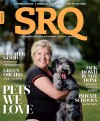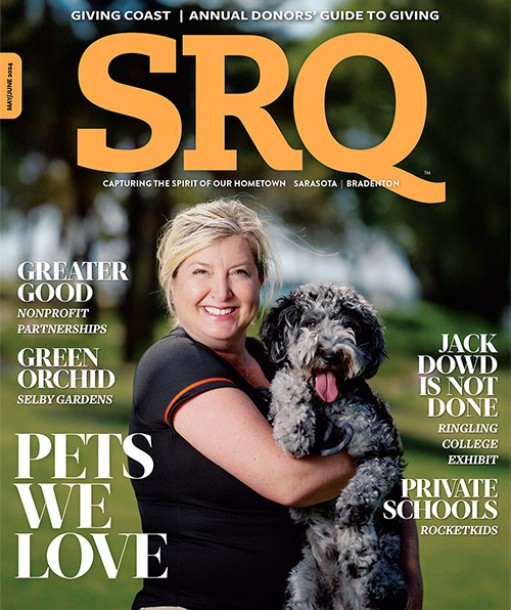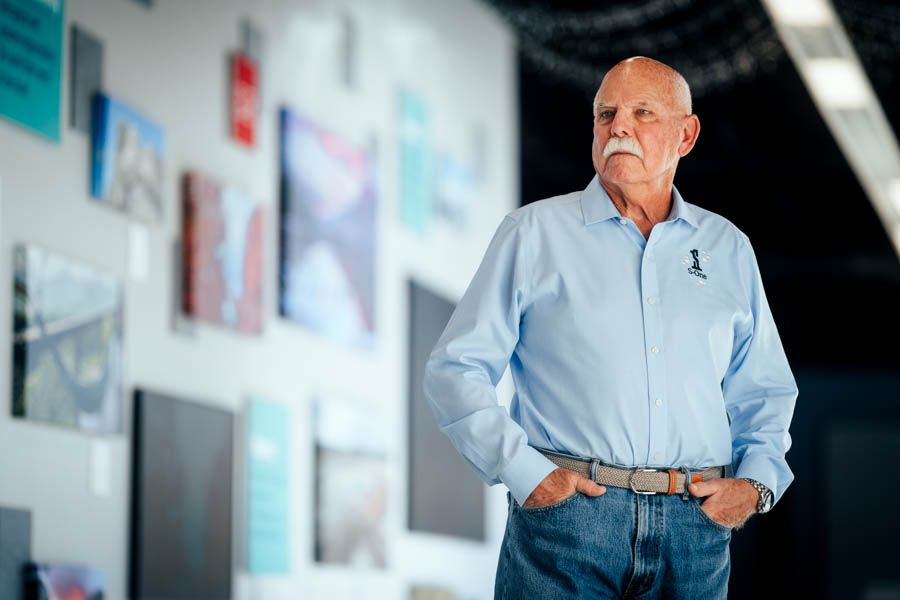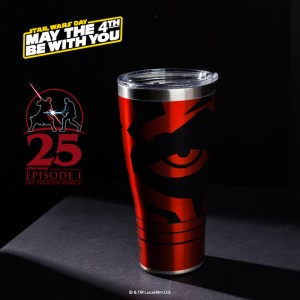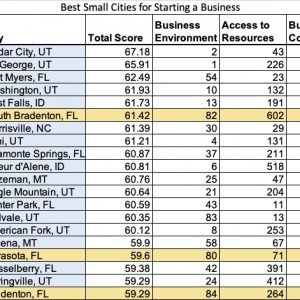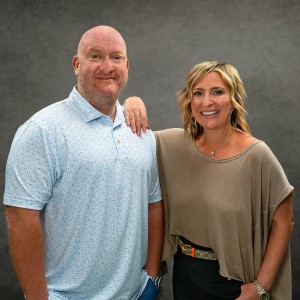Recognized as leaders in their fields and top companies to work for, S-One Holdings Corporation and Perform[cb] are two global organizations headquartered in Sarasota. Art Lambert, c0-founder of S-One, and Erin Cigich, CEO of Perform[cb], met with us to discuss the history, present-day status and future outlooks for these local success stories.
S-One Holdings Corporation
In the early 1990s, Art Lambert and Ron Simkins—two friends and colleagues working in the computer industry in the Midwest—decided to pick up and leave the frigid air of Chicago, Illinois behind for the sunny shores of Southwest Florida. They settled on Sarasota because it was, and still is, one of the fastest-growing parts of the U.S., according to Lambert. While the friends did think they might just sit back, relax and enjoy the Florida sunshine, they instead began to dream up a whole new approach for the printing and signage business.
S-One Holdings Corporation is about to celebrate its 30th year in business in Sarasota. “This is where we started. It’s where it all began for us, and we never imagined that we’d be doing it 30 years later, but we sure are, and it’s been a lot of fun,” says Lambert. The dynamic duo’s first local venture began with a braille sign business based on the Americans with Disabilities Act of 1990. With the new law enacted, Lambert and Simkins noticed that companies were struggling to create signage that included braille lettering. At the same time, digital inkjet printing was taking off as the fastest way to print posters. “Using our technology backgrounds, we developed a way to print sign faces with braille lettering digitally, using the emerging wide-format inkjet printers, and it was a very cost-effective process,” says Lambert. “We soon realized, however, that it was much easier to sell that material to our competitors who wanted it than it was to make signs ourselves, so we sold the sign business and we started another company in 1994, LexJet (which was our flagship company), and we sold that product. We were a one-trick pony. We sold that product to not only the other sign companies, but more importantly, to the trade show graphics producers and those companies that were able to print their graphics for trade show displays.” With newfound success, the team grew to include Lambert’s son, Dean, and four of his University of Kentucky buddies (three of whom are still with the company today).
Calling themselves “opportunists,” Lambert and Simkins then started a string of other companies, all within the digital imaging business under the S-One umbrella. The companies included Abaqa, which makes private-label materials for large companies such as Hewlett-Packard and Kodak; Brand Management Group (BMG), which holds licenses for large printer companies; Digiprint, a parts company in Brussels, Belgium; and S-One Labels and Packaging, which makes the film and ink that are used in creating sustainable, flexible packages.
S-One is recognized locally and nationally as one of the best places to work. “We have a team of young professionals who are passionate about creating new opportunities for their customers, themselves and, of course, the company, and that’s what sets us apart,” Lambert says. “Sure, we have some unique products, but anybody can come up with products. It’s the culture that we’ve cultivated that really makes us unique.” Looking back through the decades, Lambert finds the growth and change of the S-One organization to be remarkable. “We’ve gone from just five teammates to over 200. We’ve grown beyond the U.S. to over 22 countries around the world. We’ve grown from being a one-trick pony to having over 20,000 stock-keeping units, and from one distribution facility to a dozen,” Lambert says. “We started with just a handful of customers and have over 40,000 today. We’ve grown from our initial startup to four successful companies. Our web presence at LexJet now represents 30% of our LexJet business, and our web presence for Digiprint is 100% web sales.” While many companies struggle or even fail during difficult times, Lambert boasts that S-One managed to grow during the recession, the COVID pandemic and even during the great resignation (when many employees voluntarily resigned from their jobs in the wake of the pandemic). He believes this success can be attributed to the fact that S-One continued investing when its competitors were cutting back.
“Even more than the continued growth, I think what I’m most proud of is our community engagement programming,” shares Lambert. “We have teams that are mentors, we’re volunteers, we provide internships to local students, we serve on boards and we support charitable organizations in each of the communities we serve. We didn’t do that when we started, but it is a major focus for us now.”
Starting a company from scratch can be intimidating, but Lambert confidently shares that, with the right attitude, hard work and planning, it can be incredibly rewarding. “Do your due diligence and do your planning,” he advises. “There’s nothing that takes the place of a solid business plan. It doesn’t have to be a five-year plan; get through the first year, make sure you’re well-capitalized and, most importantly, be passionate about what you’re starting.”
Lambert and Simkins started their business venture three decades ago with three simple rules: “Have fun, make money, and don’t get in anybody else’s way of having fun and making money.” Today, as he walks around the company, he stops and asks his team members, “Hey, are you having any fun today?” They often look at him and say, “No, but we’re not getting in anybody else’s way of having fun,” and he knows they’ve learned well.
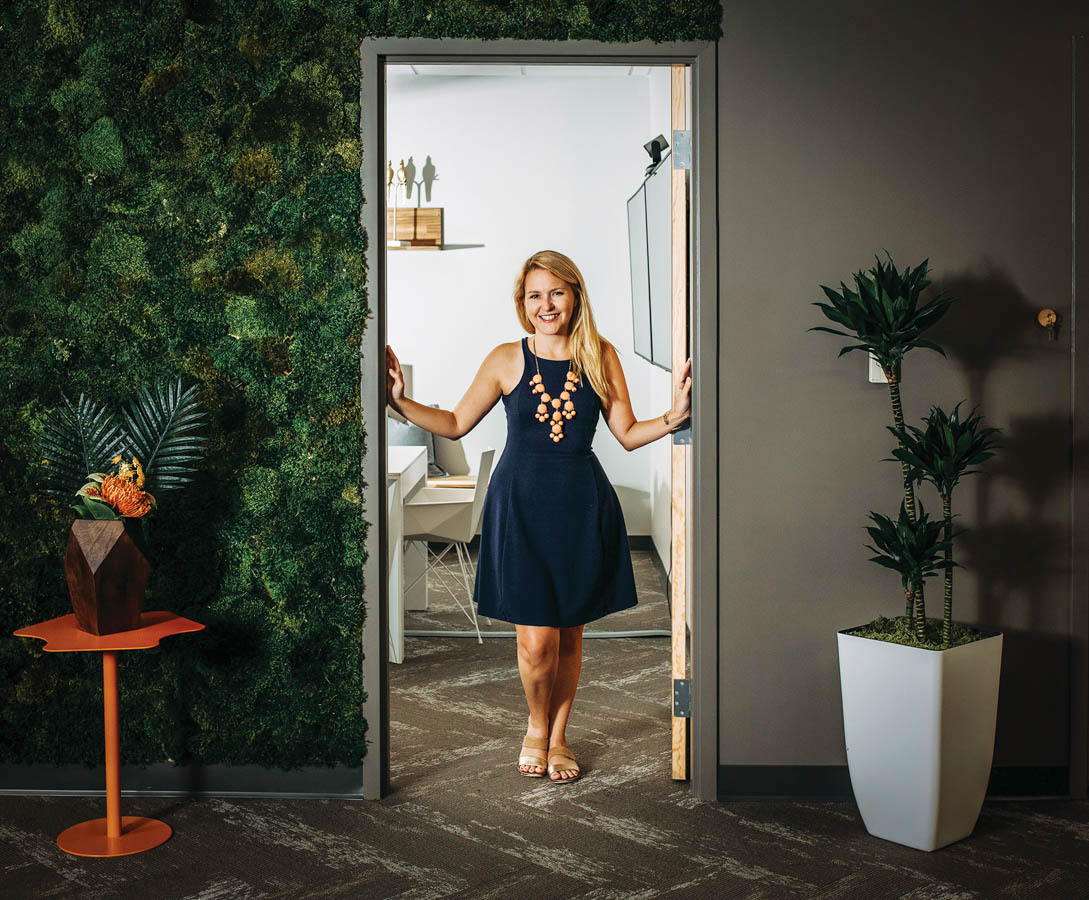
Perform[cb]
Just five days after graduating from the University of Florida in 2007, Erin Cigich joined a small company called Clickbooth in Nokomis. She recalls those early days with a smile. “Our office was above a small pool supply store in Nokomis. There was actually an external staircase—a metal staircase that you had to go up—and the entire office had no windows,” Cigich says. “We had 10 employees and everybody got to wear a lot of hats. It was definitely the classic ‘You’re not signing up for a role, you’re just there and everybody’s there to figure things out and help,’ which was really exciting. I went to school for advertising and it was an advertising business, so I thought it was the perfect place for me.” Sixteen years later, that college grad is now the CEO of Perform[cb]—a bigger, prettier, fancier, more well-funded version of what Clickbooth did when Cigich first joined the team.
The core of the business is outcome-based marketing, meaning Perform[cb] works with marketers who only pay them when they get a customer. “It was a really exciting prospect as a new college grad to join, and it’s still a really exciting prospect all these years later as a CEO to be running that business because I know that we provide real value for our clients,” Cigich says. “So that could look like anything from LendingTree (which pays us when someone fills out a form and says they want to refinance their home) to Walmart paying us when someone downloads their app and signs up for the Walmart delivery service, or BET paying us when someone downloads their app and signs up for their streaming service, or Nationwide which pays us when someone calls into their call center and signs up for a new insurance policy.”
The 10-person company that Cigich started with now has 115 employees (about 50 in Sarasota), with a globally distributed workforce spread all over the United States, Europe and Canada. “When I first joined, our name was Clickbooth. In 2016, we sold the private equity and we acquired four companies over that time period, all of different brands and names,” Cigich says. “And in 2021, we rebranded all of them to Perform[cb]—with [cb] serving as a nod to the original name—and they all just did different capabilities still within that outcome-based marketing umbrella.”
Growing has been awesome, Cigich says, but it has not been without its share of growing pains. “We’ve acquired many companies and, every time we’ve acquired a company, we have learned a good lesson. The first company that we acquired told us that absolutely everything in their technology was automated. The founder exited, we signed the checks, and it turned out it was automated because there was one person that did all of the things. He pushed the button, he sent the email, he did it all, so it wasn’t really automated. So we added that to our checklist of things that we really need to confirm when we’re buying companies,” Cigich shares. “The second acquisition we did, I stood up in front of the entire company and said, ‘We’re buying you because we love you. We love your clients. We love your client relationships. It’s not our intention to shake things up or change things.’ And boy was that a dumb thing to say to people because business is all about change. We did things like bringing in a new, upgraded coffee machine and Sonos speakers for the office, and we moved them from Microsoft to Gmail. And that was met with resistance every step of the way with them saying, ‘You said nothing was ever going to change,’ even though I thought these were positive things. So now I go the opposite route and I say, ‘We’re buying you because we really value you and we value your business and we value your opinions, but this is business and things change all the time. So things will change as they go along. That’s not a matter of whether we bought you or didn’t buy you; things are going to change in your business life.’”
Pre-pandemic, the Perform[cb] headquarters was in Sarasota. Since then, the company has subleased all of its office space and every employee is remote, Cigich explains. “The transition from in-office to the initial COVID remote working environment went smoother than expected for two reasons,” she says. “One, we had already prepped all of the technology so that people could work from anywhere because we had dealt with the hurricane the year before and understood we needed to be able to be a distributed workforce. And then the second thing was we had a Sarasota office, a Denver office and an office in Europe pre-pandemic, and so we were developing this culture of ‘the Sarasota office does it this way but the Denver office does it this way.’ But when everybody just became a box on Zoom, the walls went down and it was a lot more collaborative, which was really positive.”
Being remote has enabled the company to hire people from all parts of the world, creating a flexible work environment. “My soapbox that I stand on for remote work is that I think, because it is so much more prevalent now, it is going to allow more women in leadership,” shares Cigich. “Being a CEO and a mom myself, it makes my day so much simpler not to have to figure out how to get all the drop-offs done and deal with all of the commuting, and I can flip a load of laundry and still be on my next sales call. I think that it will be really impactful for women in leadership and hopefully help folks continue to move up the ranks that way.”
As for the secret sauce in the company’s success, it’s clear to see that it can be attributed to both the leadership and the business model. “I really like to see people be successful and I’ve always felt that way,” shares Cigich. “So, when I think about where I can drive the biggest impact, it has always been how I can get people positioned to shine and create a great team. Our leadership team has been with the business, many of them for 14 or 15 years (we’ve got a phenomenal tenure). And the fact that we’ve got a really tenured leadership team and people that are still passionate about what they do but bring a lot of experience to the table definitely sets us apart.”
The other piece that sets Perform[cb] apart from competitors is that the company has invested very heavily in technology. “The platform that powers our entire business has two patents, and it is a big competitive differentiator for us versus what the competition offers,” says Cigich.
What does the future look like for Perform[cb]? Currently, Cigich shares that the group is midway through a potential acquisition, still within the outcome-based marketing umbrella. “It’s been really incredible watching the organization grow over the past 16 years. When I first joined the company, it was very unrecognizable,” Cigich says. “Now, nine out of our top 10 advertisers are completely well-known brands that anybody would recognize. It’s really exciting to see big brands investing dollars in the outcome-based marketing space, and I think that trend will only continue because there’s a very defensible investment thesis around spending money here. You only pay when you get a customer. I think the sky’s really the limit for us.”
